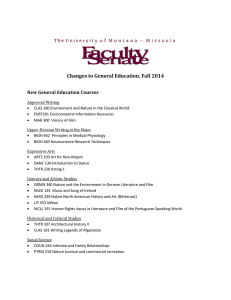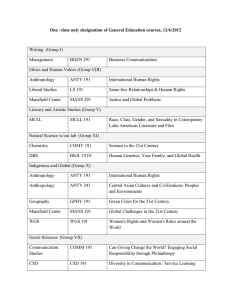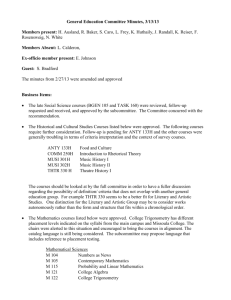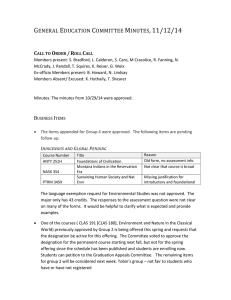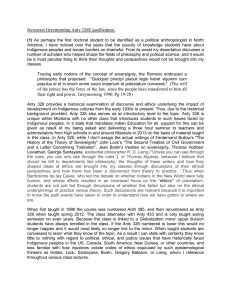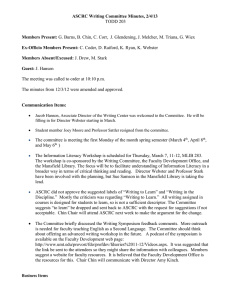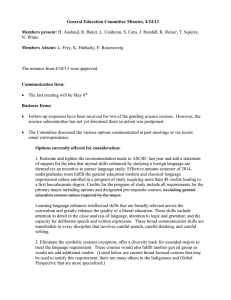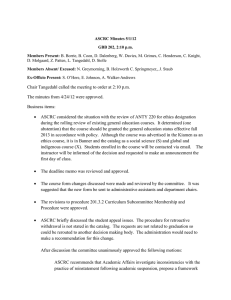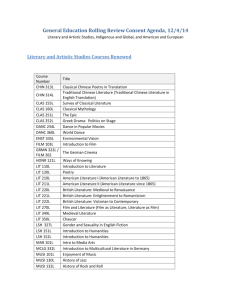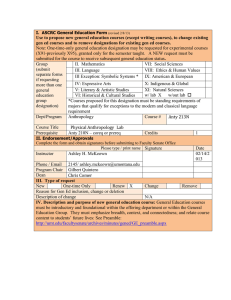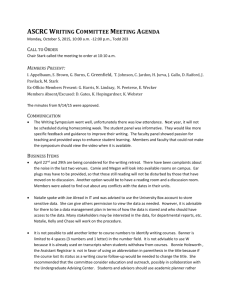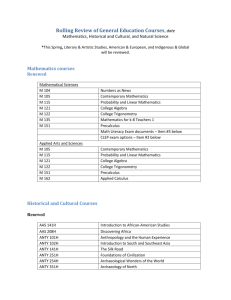General Education Committee Minutes, 4/16/14 Members present: Ex-officio Members present:
advertisement
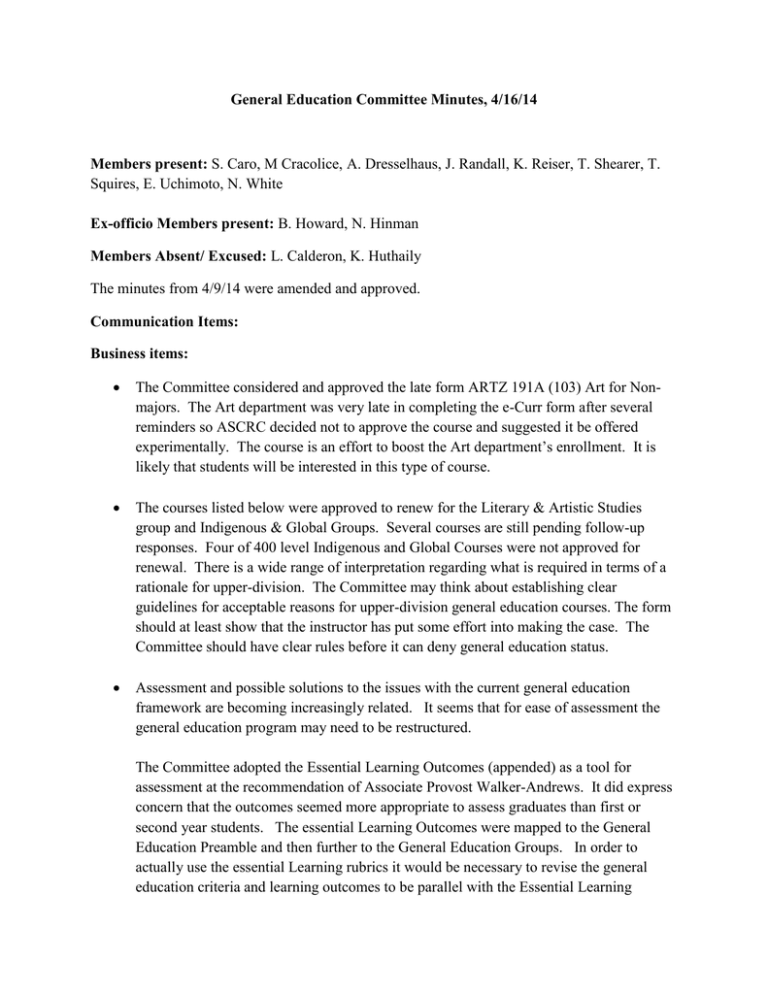
General Education Committee Minutes, 4/16/14 Members present: S. Caro, M Cracolice, A. Dresselhaus, J. Randall, K. Reiser, T. Shearer, T. Squires, E. Uchimoto, N. White Ex-officio Members present: B. Howard, N. Hinman Members Absent/ Excused: L. Calderon, K. Huthaily The minutes from 4/9/14 were amended and approved. Communication Items: Business items: The Committee considered and approved the late form ARTZ 191A (103) Art for Nonmajors. The Art department was very late in completing the e-Curr form after several reminders so ASCRC decided not to approve the course and suggested it be offered experimentally. The course is an effort to boost the Art department’s enrollment. It is likely that students will be interested in this type of course. The courses listed below were approved to renew for the Literary & Artistic Studies group and Indigenous & Global Groups. Several courses are still pending follow-up responses. Four of 400 level Indigenous and Global Courses were not approved for renewal. There is a wide range of interpretation regarding what is required in terms of a rationale for upper-division. The Committee may think about establishing clear guidelines for acceptable reasons for upper-division general education courses. The form should at least show that the instructor has put some effort into making the case. The Committee should have clear rules before it can deny general education status. Assessment and possible solutions to the issues with the current general education framework are becoming increasingly related. It seems that for ease of assessment the general education program may need to be restructured. The Committee adopted the Essential Learning Outcomes (appended) as a tool for assessment at the recommendation of Associate Provost Walker-Andrews. It did express concern that the outcomes seemed more appropriate to assess graduates than first or second year students. The essential Learning Outcomes were mapped to the General Education Preamble and then further to the General Education Groups. In order to actually use the essential Learning rubrics it would be necessary to revise the general education criteria and learning outcomes to be parallel with the Essential Learning Outcomes language. The Committee does not agree that UM’s General Education Program should be guided by this national standard. The Essential Learning Outcomes could be used as a resource, but not the guiding document. Chair White asked members to consider whether the essential learning outcomes articulate with the MUS Core. The Committee is not interested in micro assessment. It takes too much time and does not serve the students. Montana’s University system is more driven by transferability. Members should take a closer look at Easter Oregon’s Assessment Program, which received kudos from the NWCCU to determine whether this type of program could articulate with the MUS core. Would a modified approach help UM with the assessment dilemma? Interim Associate Provost Hinman indicates that the next accreditation report must show evidence of General Education Assessment in terms of measurable outputs (what students have learned) not just inputs. The Committee is working to generate the story of how assessment is progressing. It has identified where the deficiencies exist and is working towards next steps. It will continue to meet on a weekly basis until the end of the semester. The meeting was adjourned at 5:35 Literary and Artistic Studies Courses Renewed LSH 327L Gender and Sexuality in English Fiction CHIN 313L Classical Chinese Poetry in Translation CHIN 314L Traditional Chinese Literature Indigenous and Global Courses Renewed ANTY ANTY 101 241 ANTY ANTY 330 351 Anthropology and the Human Experience Central Asian Cultures and Civilizations: Peoples and Environments Cultures and Peoples of the World Archaeology of North America ANTY ANTY COMX 352 354 204 Archaeology of Montana Mesoamerican Prehistory International and Development Communication DANC ECNS HSTR HSTR JPNS LING MUSI NASX NASX 360 217 230 231 150 375 207 105 201 World Dance Economic Development Colonial Latin America Modern Latin America Japanese Culture and Civilization Endangered Languages World Music Introduction to Native American Studies Indian Culture as Expressed Through Language NASX NASX JPNS LING MUSI NASX NASX 210 231 150 375 207 105 201 Native American Sports and Games Indigenous Worldview Perspectives Japanese Culture and Civilization Endangered Languages World Music Introduction to Native American Studies Indian Culture as Expressed Through Language NASX NASX 210 231 Native American Sports and Games Indigenous Worldview Perspectives Indigenous and Global Courses NOT Renewed ANTY NASX NASX NASX 465 464 465 466 Arch of the SW United States History of American Indian Affairs to 1776 History of Indian Affairs in the 19th Century History of Indian Affairs from 1890 Essential Learning Outcomes Intellectual and Practical Skills Inquiry and analysis Critical thinking Creative thinking Written communication Oral communication Reading Quantitative literacy Information literacy Teamwork Problem solving Personal and Social Responsibility Civic knowledge and engagement—local and global Intercultural knowledge and competence Ethical reasoning Foundations and skills for lifelong learning Integrative and Applied Learning Integrative and applied learning
